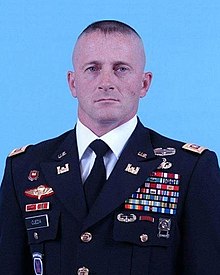2020 Iowa Democratic presidential caucuses: Difference between revisions
TheSandBot (talk | contribs) m TheSandBot moved page Iowa caucuses, 2020 to 2020 Iowa caucuses: Moving page per result of RfC on election/referendum page naming format using TheSandBot. Questions? See the RfC or msg TSD! (BRFA; please mention that this is task #1!)) |
|||
| Line 101: | Line 101: | ||
[[Category:United States presidential primaries, 2020]] |
[[Category:United States presidential primaries, 2020]] |
||
[[Category:Iowa caucuses]] |
[[Category:Iowa Democratic caucuses]] |
||
[[Category:2020 Iowa elections]] |
|||
Revision as of 20:27, 13 December 2018
The 2020 Iowa caucuses are expected to be the first votes of that year's U.S. presidential cycle and are currently scheduled to take place on February 3, 2020.[1]
Background
The Iowa caucuses first gained national attention in the 1970s when George McGovern leveraged the momentum from winning second place in the Democratic caucus as an underdog to winning the Democratic nomination in the 1972 election. [2] Future president Jimmy Carter was also able to use his win in the Iowa caucus of 1976 to propel himself to the presidency. These wins proved to be early momentum for the candidates and led to national attention on the caucuses themselves. [3]
Procedure
Historically, in the Democratic caucuses, Iowans divide into groups based on which candidate they support. Then, the voters are given a chance to switch groups, if they desire to do so. Once the groups are finalized, the chairman will decide how many representatives each group is entitled to. [4]
In the Republican caucuses, there is a straw poll which indicates the group's preferences for delegates. With an incumbent President running for reelection, the Republican caucuses will not have a straw poll and delegates will just be appointed by state party officials.[citation needed]
Candidates
As of November 2018, no candidates beside John Delaney and Richard Ojeda have officially announced intentions to run in 2020. However, there were several prominent Democrats who visited Iowa in 2016 and 2017, potentially indicating their intention to run. These politicians include Sen. Bernie Sanders, Gov. Martin O'Malley, New York City Mayor Bill de Blasio, Rep. Tim Ryan, and Rep. Seth Moulton. [5][6]
| Candidate | Most recent position | Candidacy | Total pledged delegates | Contests won | |
|---|---|---|---|---|---|
 John Delaney |
U.S. Representative from Maryland (2013–present) |
July 28, 2017 (Campaign) |
0 / 4051 (0%) | 0 | |
 |
State Senator from West Virginia |
November 12, 2018 |
0 / 4051 (0%) | 0 | |
Polling
| Poll source | Date(s) administered |
Sample size |
Margin of error |
Joe Biden |
Cory Booker |
Julian Castro |
Andrew Cuomo |
Kirsten Gillibrand |
Kamala Harris |
Eric Holder |
Amy Klobuchar |
Martin O'Malley |
Bernie Sanders |
Elizabeth Warren |
Other | Undecided |
|---|---|---|---|---|---|---|---|---|---|---|---|---|---|---|---|---|
| David Binder Research (D-Focus on Rural America) | September 20–23, 2018 | 500 | ± 4.4% | 37% | 8% | – | – | 2% | 10% | 2% | – | – | 12% | 16% | 2%[a] | 9% |
| Public Policy Polling (D-O'Say Can You See PAC) | March 3–6, 2017 | 1,062 | – | – | 17% | 4% | 8% | 3% | 3% | – | 11% | 18% | – | – | 1%[b] | 32% |
Notes
References
- ^ Pfannenstiel, Brianne. "Countdown begins to 2020: Date of Iowa Democratic caucuses set for Feb. 3". Des Moines Register. Retrieved 25 August 2018.
- ^ "Iowa Caucus History: George McGovern's Early Momentum in 1972". IPTV. 2016-11-29. Retrieved 2018-01-11.
- ^ "History May Not Help Figure Out Iowa". NPR.org. Retrieved 2018-01-11.
- ^ "Iowa Caucus: Iowa Caucus – History, Candidate Profiles, Campaign Events and Caucus News". 2007-12-22. Retrieved 2018-01-12.
- ^ Swanson, Ian (2018-01-08). "Dem hopefuls flock to Iowa". TheHill. Retrieved 2018-01-12.
- ^ Scherer, Michael (2018-05-12). "In wide-open 2020 presidential field, Democrats are road-testing messages — and trying to redefine their party". Washington Post. ISSN 0190-8286. Retrieved 2018-06-28.
